Final effort for the semester
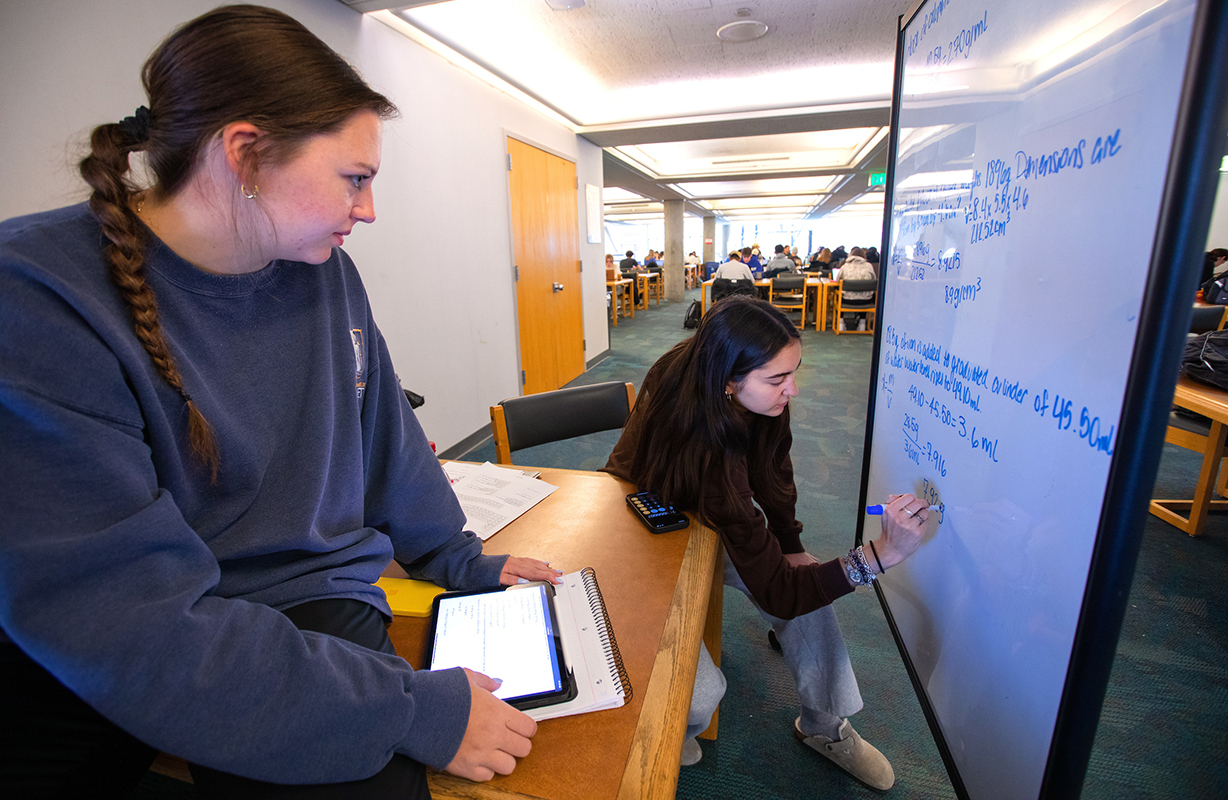
Photos by Christopher Gannon.
Students congregated in Parks Library all week as they prepped for final exams. University photographer Chris Gannon captured a few images Tuesday morning, Day 2 of exam week.
Above, sophomore study buddies Danielle Scites (left) and Ashley Schulz worked together to prepare for their Chemistry 163 final. Below, a quartet filled a table to work together on their preparation.
On the front page, freshman Valeria Carreras worked on a whiteboard while studying for her Accounting 284 final.

Focus group will help shape plan for regents' DEI recommendations
President Wendy Wintersteen has established a campus group to help develop the university's plan for addressing the 10 directives for diversity, equity and inclusion (DEI) adopted by the state Board of Regents at its November meeting.
The President's Focus Group on the Board of Regents DEI Adopted Recommendations comprises faculty, staff, students and administrators who will work with the president and senior leaders to provide feedback and help advise on a plan to comply with the recommendations. Senior vice president for student affairs Toyia Younger will gather additional student feedback through her student advisory board.
All regent universities must provide their implementation plans at the regents meeting on April 24-25, 2024.
Members of the focus group are:
- Sarah Bennet George, teaching professor, department of apparel, events and hospitality management; and president, Faculty Senate
- Shamaree Brown, senior associate athletics director for student services
- Christine Cain, graduate student in education; and president, Graduate and Professional Student Senate
- Ericka Eregbu, finance supervisor, division of operations and finance
- Carmen Flagge, director of multicultural student success, College of Human Sciences
- Heimir Geirsson, professor and chair, department of philosophy and religious studies
- Connie Hargrave, associate dean, College of Engineering
- Jennifer Holliday, undergraduate in agricultural studies; and president, Student Government
- Monica Howard, assistant dean, College of Veterinary Medicine
- Aileen Keating, associate professor, department of animal science; and faculty success advisor, College of Agriculture and Life Sciences
- Rob Lipsey, director, TRiO Student Support Services
- Luis Rico-Gutierrez, dean, College of Design
- Patrick Wall, area beef field specialist, ISU Extension and Outreach; and president, P&S Council
- Sarah Wilson, director, professional masters student services, Ivy College of Business
Senior Leadership Team:
- Wendy Wintersteen, president
- Jonathan Wickert, senior vice president for academic affairs and provost
- Toyia Younger, senior vice president for student affairs
- Heather Paris, interim senior vice president for operations and finance
- Kristi Darr, vice president for university human resources
- Mike Norton, general counsel and chief risk officer
Related stories:
- Regents discuss, approve diversity recommendations, Nov. 16, 2023
- Regents' DEI review likely to take several months, April 27, 2023
Celebrating with 1,800 new graduates
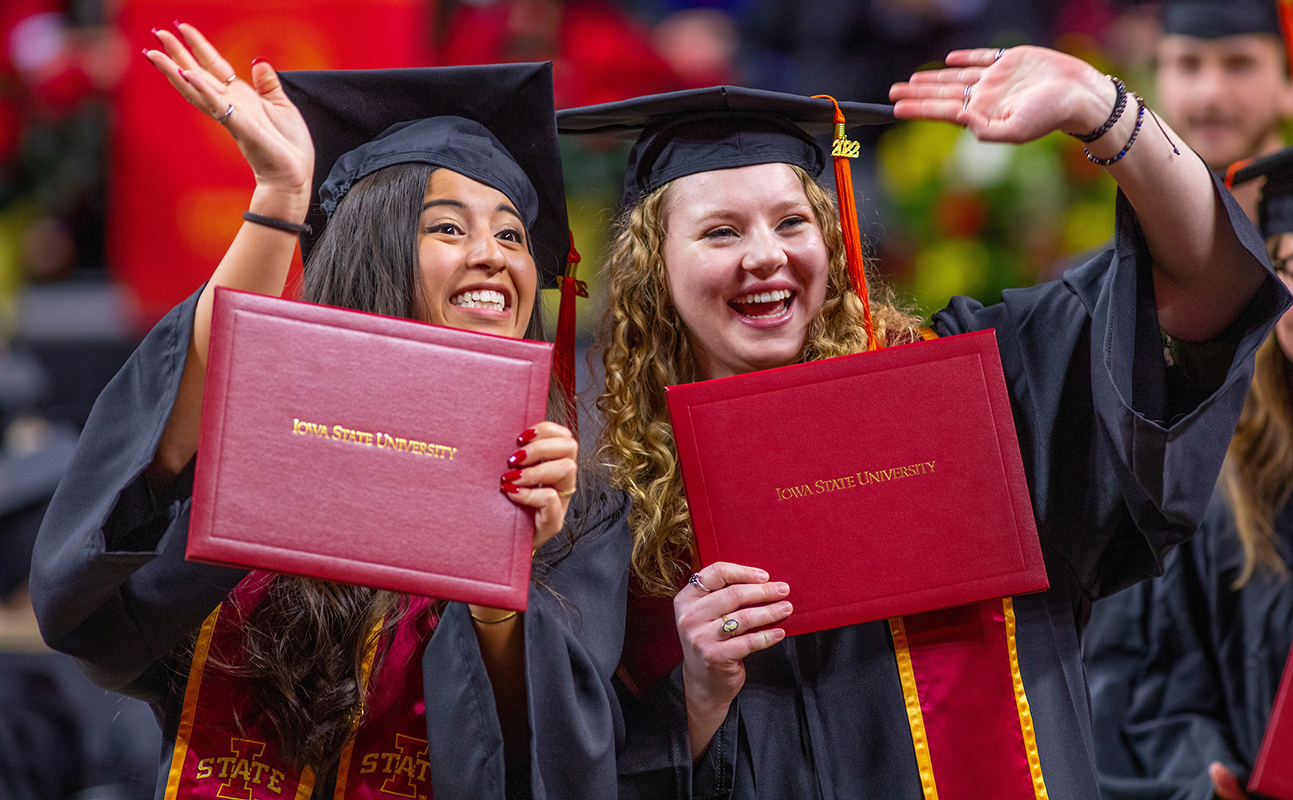
Graduating students celebrated at last fall's undergraduate ceremony. Photo by Christopher Gannon.
An estimated 1,809 students are completing their Iowa State University degrees this semester and will celebrate their accomplishments during two commencement ceremonies this weekend at Hilton Coliseum. Tickets are not needed for either event. Both ceremonies will be livestreamed.
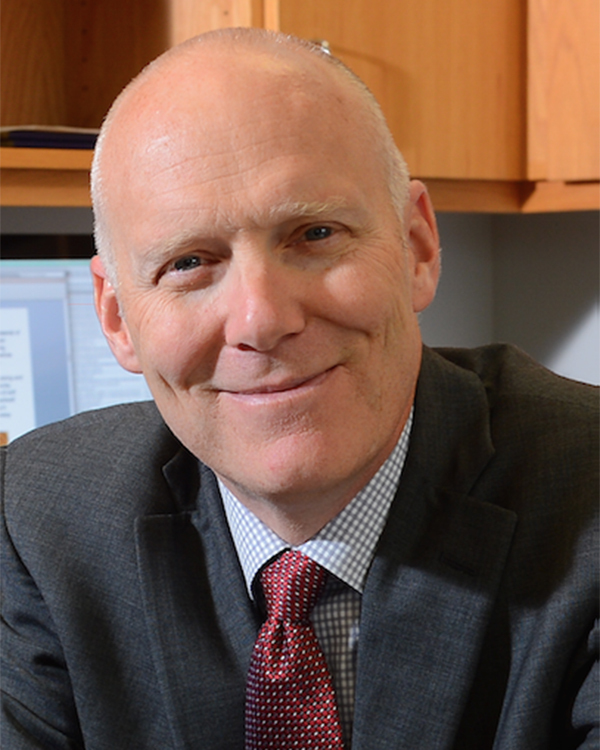
Schwartz
An estimated 224 master's and 94 doctoral students will be honored during the Graduate College's ceremony at 7 p.m. Friday, Dec. 15. Adam Schwartz, director of the U.S. Department of Energy's (DOE) Ames National Laboratory for the last 10 years, will address the graduates. Schwartz also is professor of materials science and engineering at Iowa State. Previously, he spent nearly 23 years as a materials science researcher and administrator at the DOE's Lawrence Livermore National Laboratory in Livermore, California.
Doctor of Veterinary Medicine professional students graduate as a class once a year, in May.

Neuhold-Ravikumar
An estimated 1,491 bachelor's degree recipients will be honored during a 1:30 p.m. ceremony Saturday, Dec. 16. Alumna Ruki Neuhold-Ravikumar, who stepped down last month as president of the Kansas City Art Institute, will give the address. Prior to her work at the art institute, she served for five years in administration roles at the Smithsonian Institution, Washington, D.C., and New York City; and for 13 years in the College of Fine Arts and Design at the University of Central Oklahoma, Edmond.
College celebrations
Iowa State's six undergraduate colleges will honor their students during college receptions and convocations Dec. 15-16:
- Engineering, by department, various start times and campus locations, Friday and Saturday
- Agriculture and Life Sciences, 9 a.m. Friday, Hilton Coliseum, livestream
- Human Sciences, 1 p.m. Friday, Stephens Auditorium, livestream
- Business, 4 p.m. Friday, Hilton Coliseum, livestream
- Liberal Arts and Sciences, 4 p.m. Friday, Stephens Auditorium, livestream
- Design, 5 p.m. Friday, 101 Design (auditorium), livestream
Parking
Commencement participants and guests may park in available lots at the Iowa State Center with one exception. Lot C2, between Hilton Coliseum and Center Drive, is reserved for handicap parking. CYTown construction temporarily closed lots A4-5 and B4-5 at the south end. Campus lots 56 and 63, north of the Maple Willow Larch residence halls, also are available for graduation guests. For their safety, guests who park there are asked to cross Lincoln Way at the Beach Avenue crosswalk.
Another round for caps and gowns
Bachelor's degree recipients who purchased a cap and gown for their ceremony and would like to help low-income future Cyclone graduates dress for their big day can donate their cap and gown after the ceremony. STORIES, a universitywide program to meet the basic needs of students who experienced foster care or homelessness, is sponsoring the collection. The drop-off site at Hilton is in the southeast corner of the concourse on Saturday only. Drop-off boxes for recycling will be inside the Memorial Union west entrance and Student Services Building north entrance through Thursday, Dec. 21.
Protect your information from holiday hackers
It's lunchtime and you're planning after-work errands -- pick up more wrapping paper, go to the post office -- when a text message flashes on your phone: We noticed unusual activity on your bank account. Verify your information here.
Lunch set aside, you prepare to spend the next 20 minutes handling the situation. But you take a closer look at that text message. Is that message real, or is it a scam?
Scams you might see

This time of year sees an uptick in online scams that may come in the form of text message, email or phone call.
"Scammers want your money, so they do their best to be creative and convincing," said Rich Tener, Iowa State's chief information security officer. "Most scams are variations on getting people to hand over payment card information, sensitive personal information or login credentials for your bank, or directly transferring money to them."
Two of the scams surfacing this holiday season involve banking and package delivery.
Unusual banking activity. A scammer pretends to be from a financial institution, claiming they have detected unusual activity with your card or account. You are prompted to provide personal information over the phone or within an online form.
"I received a scam call from an 866 number with a very convincing automated message saying unusual activity was detected on my bank account. When I called the number back, there was a human on the line and they asked me for my bank card number," Tener said.
Package delivery. A scammer pretends to be from a postal or shipping company. They may claim you need to verify your personal information before a package can be delivered. They also may threaten to return your package to the manufacturer if you don't take action immediately.
For more information about scams, how to recognize them and how to avoid them, visit the Federal Trade Commission's imposter scams website.
AI in the picture
Artificial intelligence is top-of-mind in the tech world. For scammers it's no different. By leveraging AI, scammers are able to make fraudulent messages more convincing.
"You used to be able to spot a scam from misspellings or grammatical errors," Tener said. "Now, those signals are not as common."
AI tools can correct errors in writing, but there are other ways to identify scams and stay protected online.
Staying protected against scams
According to Tener, the number one piece of advice for protecting yourself against scams is to verify who you're talking to -- always -- whether that's your bank, a friend, a coworker or even a family member.
If someone calls with an usual request for information or money, politely hang up and call them back on a number you know is theirs. If you don't have a phone number saved for a company that contacts you, check their website to find a phone number you can trust.
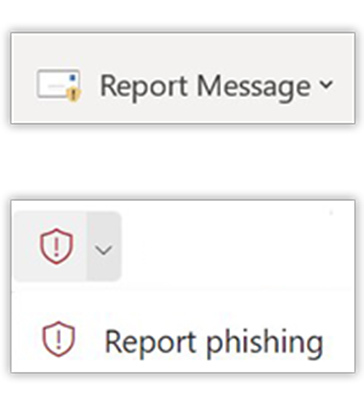
If the request is through text message or email, contact that person or company through a different medium. A phone call is usually best. Again, make sure you verify their phone number independently.
If you receive a suspicious message or phone call as an Iowa State employee, report it to the IT Security team. For a suspicious email, use the Report Message button in Outlook that routes directly to Tener and team. For a suspicious text message or phone call, send an email to security@iastate.edu with details of the situation and any helpful screenshots.
More tips for recognizing holiday scams
- Be certain you use the company being referenced. If you don't do business with them, there's a good chance it's a scam.
- Watch for time-sensitive messages. Many scams will invoke a sense of urgency, with a "do this now or face the consequences" message.
- Take a close look at not only the sender's name but their email address. Consider the level of professionalism.
- If you need to follow up on the message or phone call, contact the person or company through information you've verified. Do not use the contact information they provide in the message or over the phone.
Brown elected to National Academy of Inventors
Robert C. Brown, an Iowa State engineer who has 26 U.S. patents, has been elected a fellow of the National Academy of Inventors (NAI).
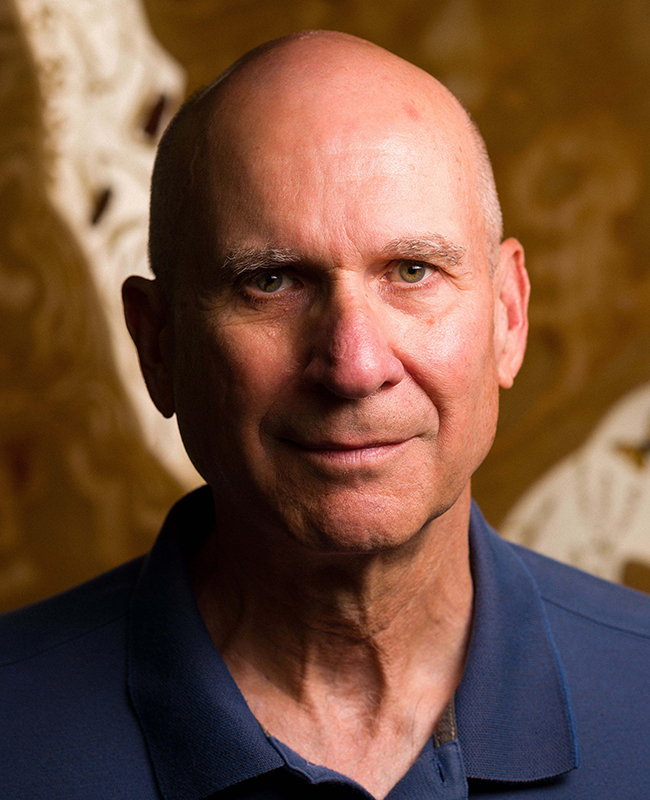
Robert C. Brown
Many of Brown's inventions involve the thermochemical conversion of biomass such as corn stalks or wood chips into a liquid bio-oil for energy and a biochar for fertilizer. One such invention changed how a technology called fast pyrolysis provides energy to the process of breaking down biomass.
The standard way transfers external heat energy into a reactor. Brown's new "autothermal" process adds air to the reactor to burn a small amount of the pyrolysis products. That turns out to be a more efficient way to heat and break down biomass. And, this partial combustion does little to affect the yield of bio-oil.
"I really enjoy brainstorming new ideas -- especially if they induce eye rolling among staff members, which was the case for autothermal pyrolysis," said Brown, the co-director of the Bioeconomy Institute, an Anson Marston Distinguished Professor in Engineering and the Gary and Donna Hoover Chair in Mechanical Engineering.
The academy's selection committee said in a statement that Brown was elected because he had "demonstrated a highly prolific spirit of innovation in creating or facilitating outstanding inventions that have made a tangible impact on the quality of life, economic development, and welfare of society."
Brown reacted to his election by saying, "Of course I'm delighted. I've always thought of myself more as an inventor than as a faculty member or an engineer."
Brown said there are more inventions in his research group's pipeline, everything from using a pyrolysis/biochar system to compete for a $50 million grand prize from the XPRIZE Foundation for carbon removal to developing technology for the rapid carbonation of beer. (The latter was named "RCB" by his students, which happens to be his initials, said Brown, who teaches an experimental course, the "Science and Practice of Brewing.")
Brown and other members of this year's class of fellows will be formally inducted next June at the NAI's annual conference in Raleigh, North Carolina.
Good company at Iowa State
Other NAI fellows from Iowa State and their years of election are:
- Iver Anderson, 2015, an adjunct professor of materials science and engineering and a senior metallurgist for the U.S. Department of Energy's Ames National Laboratory
- Patrick Halbur, 2016, professor and chair of veterinary diagnostic and production animal medicine
- Surya Mallapragada, 2016, Anson Marston Distinguished Professor in Engineering, the Carol Vohs Johnson Chair in Chemical and Biological Engineering, associate vice president for research and a scientist for the Ames National Laboratory
- Balaji Narasimhan, 2019, an Anson Marston Distinguished Professor in Engineering, the Vlasta Klima Balloun Faculty Chair and director of the Nanovaccine Institute
- Guru Rao, 2019, professor emeritus of biochemistry, biophysics, and molecular biology and a former associate vice president for research
- Max Rothschild, 2017, Charles F. Curtiss Distinguished Professor Emeritus in Agriculture and Life Sciences
- Costas Soukoulis, 2018, Distinguished Professor in Liberal Arts and Sciences Emeritus and a former senior scientist at the Ames National Laboratory
- Jonathan Wickert, 2014, senior vice president and provost, and professor of mechanical engineering
Senators to learn more about a flat fee for course materials
Faculty senators concluded business during their final meeting of the year Dec. 12 and looked ahead to a key issue when they reconvene in January.
At the first meeting of spring semester, representatives from the ISU Book Store will present information about a proposed flat fee for course materials that would take effect for the fall 2024 semester. Faculty Senate president Sarah Bennett-George said she received numerous questions about the proposed policy.
"This is really immediate access 2.0," said associate provost for academic programs Ann Marie VanDerZanden. "It would use a flat-rate fee for every student that is significantly less expensive than if they were to buy each of those books and course materials individually. It is a policy that still is under review and discussion."
VanDerZanden said more than 94% of faculty already use immediate access materials, but faculty still have the option to use materials that are not part of the program. Students also have the option to not use the immediate access option and must get course materials through the bookstore or third-party provider.
Repeat courses
Senators will vote at the next meeting on three updates to the grading policy on repeating courses in the ISU catalog. Proposed changes would clarify:
- The most recent grade for a retaken course initially taken at ISU will be used to calculate the cumulative GPA.
- Courses originally not taken at ISU do not count toward the 18-credit repeat limit.
- Students can retake a course taken at ISU at other institutions -- and credits earned can be applied toward graduation requirements. However, the grade earned will not replace the one at ISU or be used to compute a cumulative GPA.
Other business
Senators will vote at the January meeting on:
- A 30-credit online master of digital health program that would combine aspects of health care, technology and data analytics. It focuses on using digital tools and analytics to improve human health through wearable devices, telehealth, mobile health and more. Students would incorporate digital technology into exercise delivery, use data to develop solutions for individuals or target populations, and help patients manage their health care through technology. Two faculty would be hired to help the Center for Excellence in Learning and Teaching develop online course content.
- A new bachelor program in sports media and communication with youth to professional sports applications. Areas of study and practice would include broadcast television, social media, talk radio, podcasts, websites and video games. Students would complete a 400-hour internship. The 31-credit major would require students to complete a minor outside Greenlee School of Journalism and Communication.
- A proposed undergraduate minor in applied mathematics to teach students various aspects of mathematics to supplement their major. The minor would be beneficial to students with majors in engineering, computer science, physics and others.
- A proposed name change for a bachelor program, from biological and premedical illustration to scientific illustration and visualization, in the College of Liberal Arts. The change is designed to improve visibility, clarify what the program offers and boost student recruitment. The term premedical has confused prospective and enrolled students.
Senators approved:
- A modification to the Faculty Handbook in a section on interim action when filing a formal complaint that replaces "calendar days" with "days." The section on appeals of a provost's decision regarding a conduct case to the president added current details of the process.
- An online master of applied statistics, helping fill the need to train individuals who can make data-driven decisions across many fields and industries. The 30-credit degree program will use online versions of 23 credits currently taught in person. The other seven credits are from new courses.
- The fall graduation list of more than 1,800 students.
P&S Council fills more vacant seats
Members of the Professional and Scientific Council approved appointments for three new members at their Dec. 7 meeting. George Loper, Memorial Union; Brimah Vonjo, residence department; and Adam Wade, chemistry, will serve as council members until at least June 30 -- and potentially longer if they seek a permanent seat in the council's March election.
This marked the second consecutive month the council approved appointments due to members leaving the university or resigning from council due to demands on their work time. Council president Patrick Wall said the professional staff councils at the universities of Iowa and Northern Iowa are reporting a similar challenge with resignations from members.
According to its constitution, the council should have one member for every 75 P&S employees.
Tight schedules
The annual professional development daylong conference hosted by the council for P&S employees will be held Wednesday, Feb. 28, at the Gateway Hotel, and registration opens in January. Registration will go up $10 for 2024, to $150 ($130 early bird).
The date coincides with the half-day pre-conference for faculty and staff that precedes the Iowa State Conference on Race and Ethnicity (ISCORE) at the Memorial Union. Jennifer Schroeder, chair of the council's professional development committee, said the two planning teams are aware of the overlap and neither is able to reschedule their event.
ISCORE has been moved to a Thursday for 2024 (Feb. 29); registration opens Jan. 29.
Holiday collections
In its second annual collection for the SHOP food pantry on campus, P&S employees donated 2,608 pounds of nonperishable foods during November. Logistics and support services provided a vehicle and staff member to help Sarah Larkin, council vice president for communications and community relations, deliver donations from a dozen campus locations to the pantry in Beyer Hall on Dec. 1.
The council's diversity, equity and inclusion committee organized a collection of winter outdoor gear for the Resource Room in the Sloss House. Council members donated more than two dozen coats, hats, gloves and boots last week.
Reminders about winter session and winter break
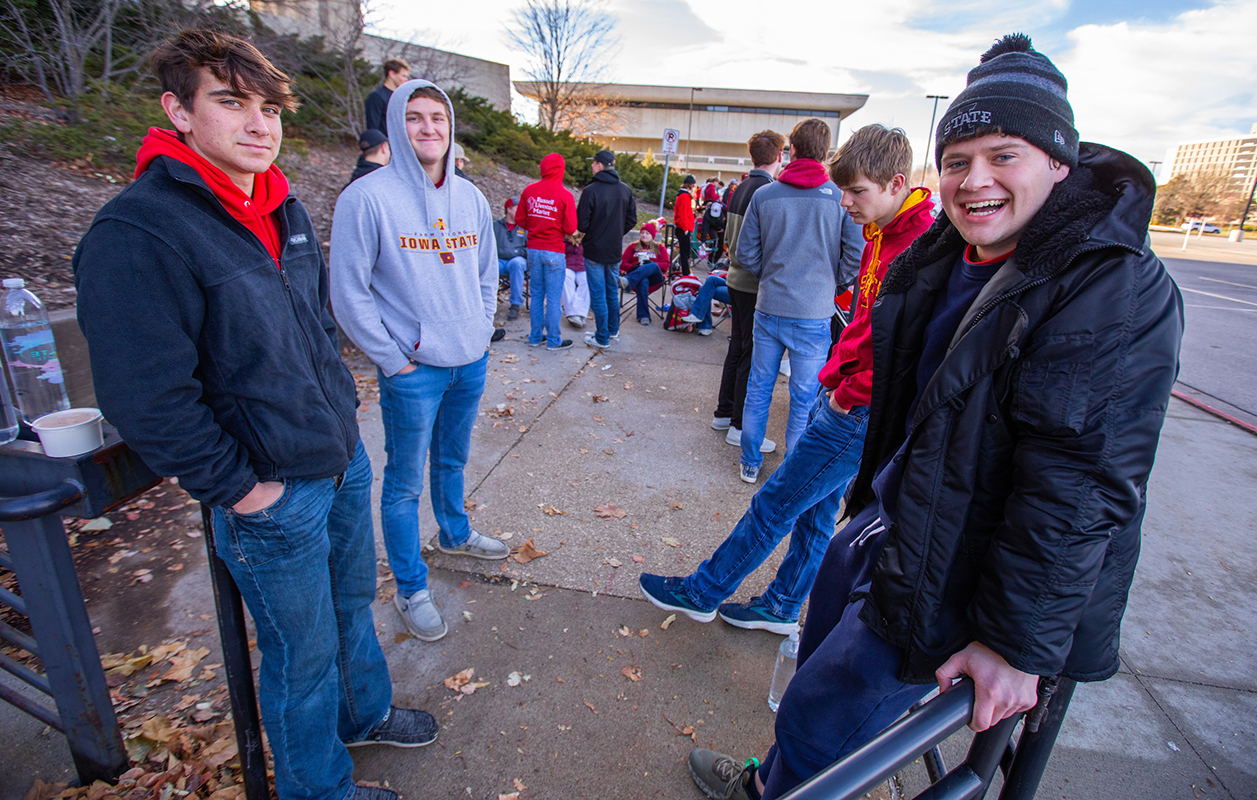
The first four students in line for the Iowa State-Iowa men's basketball game Dec. 7 arrived 25 hours early, just as the women's CyHawk game tipped off. (l-r) Sam Seddon, Kain Harrison, Tristan Weers and Casey Michelson stayed warm overnight in a heated tent purchased for ice fishing. Athletic contests in multiple winter sports continue at Hilton during winter break, and with most students away from Ames, good seats are available. Photo by Christopher Gannon.
With the close of fall semester, the Iowa State community prepares for the start of its fourth winter session. It presents students an opportunity to get closer to completing graduation requirements.
Out-of-office energy checklist
Faculty and staff who will be out of the office for an extended time during the winter break should make sure their workspace is in energy-saving mode before they depart. Here are some tips from environmental health and safety:
-
Shut down all computers, printers and other accessories. Leave your office computer on if needed for remote access or critical operations, but turn off connected devices.
-
Turn off and unplug copiers, space heaters, coffee pots, microwaves, desk lamps, radios and chargers for electronic devices.
-
Make sure faucets in restrooms and break rooms are turned off and not dripping. If you notice a dripping faucet, contact the FPM service center at 515-294-5100.
-
Turn off office lights and public lighting, such as hallways, restrooms and conference rooms.
-
Check windows to make sure they're closed tightly.
-
Contact your building manager to have the temperature adjusted.
-
Shut down unnecessary climate-controlled plant growth chambers and close fume hood sashes completely, if possible.
More than 1,620 undergraduates are registered for winter session. Among the group, 47% are seniors and another 27% are juniors. Freshmen and sophomores together make up 26% of winter session students. The total number of students taking a course during the winter session is consistent with the first three years.
The online winter session begins Monday, Dec. 18, and concludes Friday, Jan. 12. It contains three university holidays, Dec. 25-26 and Jan. 1. Gov. Kim Reynolds announced two additional paid holidays for state employees, one of which falls on with one implemented by the university on Dec. 27. Offices are closed and classes won't meet that day.
A top priority during the four weeks is maintaining staff levels to support a successful winter session for enrolled students. Most students are not in Ames but have access to academic support and student services online.
Units open during the winter break may implement break office hours (7:30 a.m.-4 p.m.) from Dec. 18 through Jan. 12.
Taking a break
Winter break also is the time when it's possible to reduce services and allow employees to use accrued vacation time. When possible, university leaders encourage employees to use this time to relax and recharge.
For employees looking to enjoy a significant chunk of time away from work duties around the holidays, they can use two vacation days (Dec. 28-29), two weekends, the state workers holiday and the three university holidays to create a 10-day break, Dec. 23-Jan. 1.
Enjoying your break
For sports fans, several Cyclones teams will host events during the break, including men's and women's basketball. The football team travels to Memphis, Tennessee, to face the Tigers in the Liberty Bowl on Dec. 29.
Here's a rundown of some key campus services' operational plans in the window between fall and spring semesters.
Open weekdays Dec. 18-Jan. 12 (7:30 a.m.-4 p.m.) except Dec. 28-29 (8 a.m.-noon). Closed Dec. 25-27 and Jan. 1.
Break schedule in effect Dec. 15-Jan. 15, eliminating some routes and reducing frequency on others. No service Dec. 25 and Jan. 1. Service ends at 6 p.m. Dec. 24 and Dec. 31. No Moonlight Express Dec. 15.
Student health and wellness
Student Counseling Services and Thielen Student Health Center open weekdays 7:30 a.m.-4 p.m.
Open weekdays 9 a.m.-5 p.m., Saturdays 10 a.m.-4 p.m. Closed Dec. 23-26, Dec. 29-Jan. 1 and Jan. 4 and 7.
Limited locations begin opening Jan. 7, gradually expanding until spring semester starts. Closed Dec. 18-Jan. 7. See online schedule for hours and menus.
Open weekdays 7:30 a.m.-5 p.m., weekends noon-4 p.m. Closed Dec. 25-27, Jan. 1.
See online schedule for reduced hours Dec. 18-Jan. 14 and library department hours. Closed Dec. 23-27, Dec. 30-Jan. 1, Jan. 13.
See online schedule for reduced hours Dec. 16-Jan. 14. All facilities closed Dec. 23-25 and Jan. 1.
Open until 7 p.m. on Tuesdays (Dec. 19 and 26) for the RG Express train exhibit. Open 5-9 p.m. for Winter Wonderscape Holiday Light Show Dec. 14-16, 21-23 and Dec. 28-Dec. 30. Closed Dec. 25 and Jan. 1.
Ticket offices
Athletics ticket office at Jacobson Building closed Dec. 25-26 and Jan. 1.
Stephens Auditorium ticket office open weekdays 11 a.m.-4 p.m. Closed Dec. 25-29 and Jan. 1. Check online for updates.
Kiosk and fuel pumps available 24/7. Call after-hours line at 515-509-1686 with emergencies. Closed Dec. 23-Jan. 1.
All galleries closed Dec. 18-Jan. 15.

